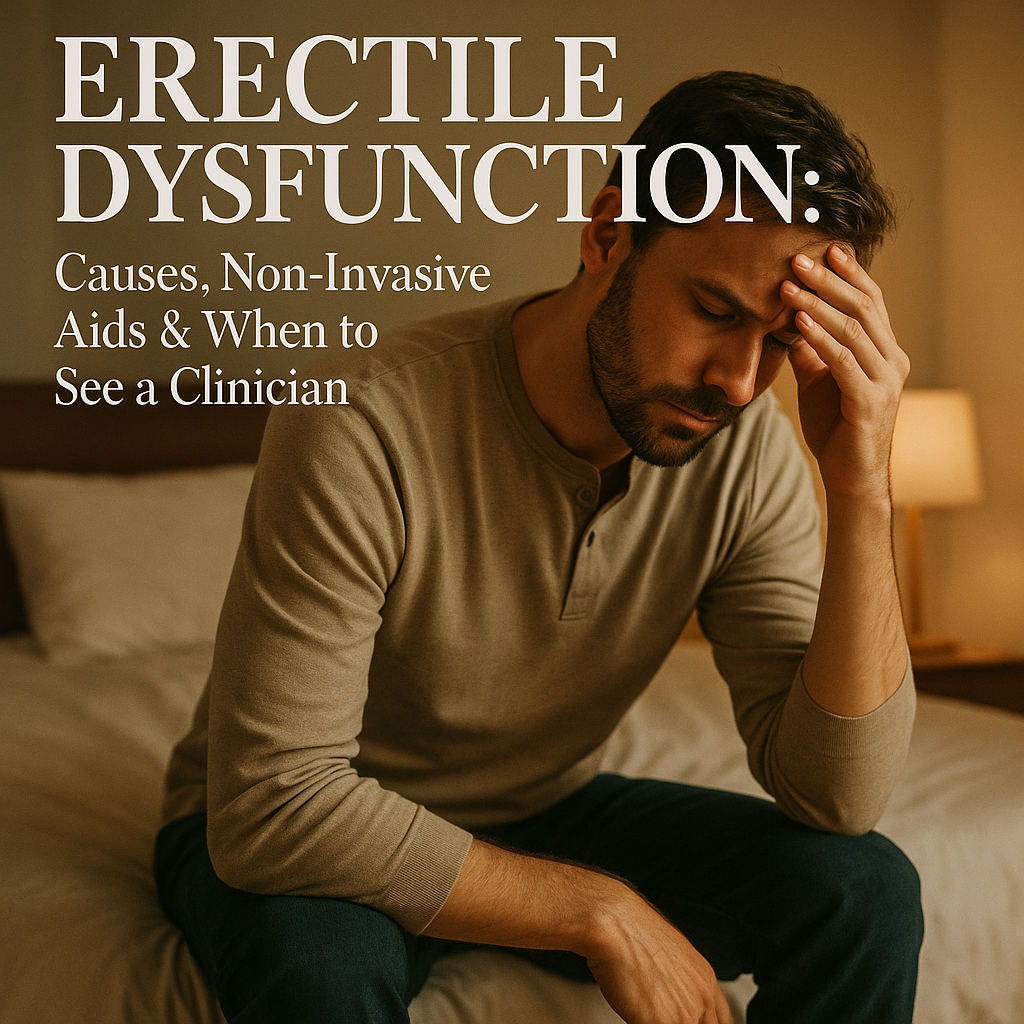Erectile Dysfunction: Causes, Non-Invasive Aids & When to See a Clinician
Erectile Dysfunction: Causes, Non-Invasive Aids & When to See a Clinician
TL;DR
Erectile dysfunction (ED) is a common condition that can stem from various causes, including psychological and physical factors. Non-invasive aids, such as lifestyle changes, therapy, and certain devices, can help manage ED. If symptoms persist, consulting a clinician is essential for proper diagnosis and treatment options.
Editor’s Note
This article aims to provide an overview of erectile dysfunction, focusing on its causes, non-invasive aids, and guidance on when to seek professional help. The information provided is for educational purposes only and should not replace professional medical advice.
Understanding Erectile Dysfunction
Erectile dysfunction refers to the inability to achieve or maintain an erection sufficient for satisfactory sexual performance. It is a common issue that affects men of all ages but is more prevalent in older men.
Prevalence of Erectile Dysfunction
According to the Massachusetts Male Aging Study, nearly 52% of men experience some form of erectile dysfunction at some point in their lives. The likelihood of experiencing ED increases with age and may be associated with various underlying health conditions (source: NCBI).
Causes of Erectile Dysfunction
The causes of erectile dysfunction can be broadly categorized into physical and psychological factors.
Physical Causes
- Cardiovascular Diseases: Conditions such as atherosclerosis can restrict blood flow to the penis.
- Diabetes: High blood sugar levels can damage nerves and blood vessels.
- Hormonal Imbalances: Low testosterone levels can impact sexual function.
- Neurological Disorders: Conditions such as multiple sclerosis and Parkinson’s disease can affect nerve signals.
- Medications: Some prescriptions can have side effects that lead to ED (source: NCBI).
Psychological Causes
- Stress and Anxiety: Performance anxiety can create a cycle of erectile dysfunction.
- Depression: Mental health conditions can significantly affect libido and overall sexual function.
- Relationship Issues: Communication problems with a partner can also contribute to erectile difficulties.
Non-Invasive Aids for Erectile Dysfunction
There are various non-invasive aids and lifestyle changes that can help manage erectile dysfunction.
Lifestyle Modifications
Implementing lifestyle changes can significantly impact erectile function. Here are some practical routines:
- Regular Exercise: Engaging in physical activity improves blood flow and can enhance erectile function (source: NCBI).
- Healthy Diet: A balanced diet rich in fruits, vegetables, whole grains, and lean proteins can improve overall cardiovascular health.
- Weight Management: Maintaining a healthy weight can reduce the risk of diabetes and cardiovascular diseases, both of which are linked to ED.
- Avoiding Tobacco and Excessive Alcohol: Smoking and excessive alcohol consumption can impair blood circulation.
Psychological Support
Addressing psychological factors is crucial for managing erectile dysfunction. Here are some approaches:
- Cognitive Behavioral Therapy (CBT): This therapy can help address negative thoughts and behaviors associated with ED.
- Couples Therapy: Involving a partner in therapy can help improve communication and intimacy.
- Stress Management Techniques: Practicing mindfulness, meditation, or yoga can alleviate anxiety and stress levels.
Medical Devices
Non-invasive medical devices can also assist in managing ED:
- Pump Devices: Vacuum erection devices (VEDs) can help achieve an erection by drawing blood into the penis.
- Penile Implants: While typically surgical, some non-invasive adjustable devices are available that can be fitted externally.
Herbal Supplements and Nutraceuticals
Some herbal supplements may provide benefits, although it’s essential to consult a healthcare provider before starting any new supplement:
- Panax Ginseng: Known for its potential to enhance sexual function.
- L-arginine: This amino acid may help improve blood flow.
- Yohimbine: Derived from the bark of an African tree, it has been studied for its potential effects on ED (source: NCBI).
When to Consult a Clinician
While many cases of erectile dysfunction can be managed with non-invasive aids, it is essential to know when to seek professional help. Consult a clinician if:
- ED occurs frequently or persists over time.
- There are additional symptoms, such as pain during erections, a decrease in libido, or changes in urination.
- You have underlying health conditions, such as diabetes or heart disease.
- You are experiencing emotional distress related to sexual function.
Frequently Asked Questions (FAQs)
1. What is erectile dysfunction?
Erectile dysfunction is the inability to achieve or maintain an erection adequate for sexual intercourse.
2. What are the common causes of erectile dysfunction?
Common causes include cardiovascular diseases, diabetes, hormonal imbalances, psychological issues, and certain medications.
3. Can lifestyle changes improve erectile dysfunction?
Yes, lifestyle modifications such as regular exercise, a healthy diet, weight management, and reducing tobacco and alcohol consumption can improve erectile function.
4. When should I see a doctor for erectile dysfunction?
If symptoms persist, or if you experience additional symptoms like pain or a decrease in libido, it’s advisable to consult a clinician.
5. Are there non-invasive treatments for erectile dysfunction?
Yes, non-invasive treatments include lifestyle changes, psychological counseling, vacuum erection devices, and certain herbal supplements.
6. Can psychological factors contribute to erectile dysfunction?
Yes, psychological factors such as stress, anxiety, and depression can significantly affect erectile function.
7. Are herbal supplements safe for erectile dysfunction?
Some herbal supplements may be beneficial, but it is essential to consult a healthcare provider before starting any new supplement.
8. What are the risks of ignoring erectile dysfunction?
Ignoring ED can lead to worsening symptoms, potential relationship issues, and underlying health conditions that require treatment.
Sources
Share this content:


Post Comment